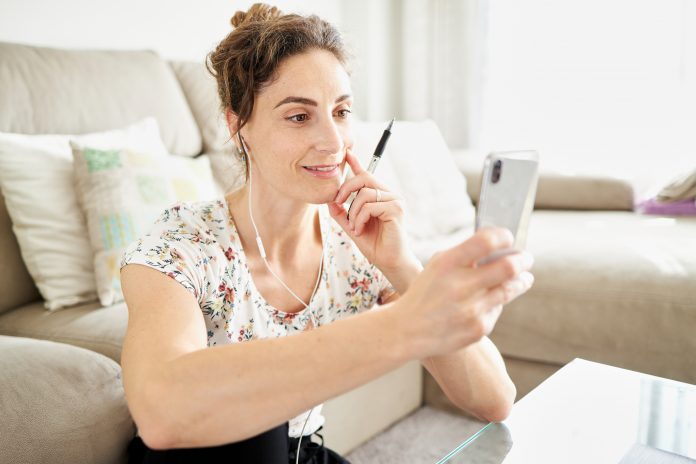Steve Dell, Anxiety and hypnotherapy expert, advises what social anxiety sufferers can do to make video-calling easier
Social anxiety affects people in different ways, and it can quickly impact an individual’s entire life if it is not addressed. People with a social anxiety disorder are often:
- Frightened of going out in public
- Afraid of social situations e.g. parties and meetings
- Shy or timid around other people
Whilst symptoms can vary from person to person, the nature of social anxiety disorder can make everyday tasks like going to work and school very difficult. Even video-calling can make social anxiety sufferers uncomfortable, which presents issues for those working from home.
Over the past few months, a significant proportion of the population has transitioned to working from home. It’s also likely that this will continue into the new year. Whilst this can help those with social anxiety in some situations, everyday tasks such as video-calling can induce feelings of dread and panic.
With this in mind, it’s important that employers do what they can to ensure all of their employees feel comfortable whilst working inside and outside of the office. This also begs the question, what can you do if endless Zoom calls are triggering your social anxiety? We’ve spoken to anxiety and hypnotherapy expert, Steve Dell, to find out.
What is social anxiety disorder?
Social anxiety (also known as social phobia) is one of the most common anxiety disorders. This condition has a 12% prevalence rate (estimated) in society, which is double the prevalence rate of general anxiety disorder.
Many often dismiss social anxiety as ‘shyness’, however, the condition is a lot more severe in reality. Social anxiety sufferers often develop an intense fear of social situations, and some of the worst cases feel nauseous and anxious in public, dread everyday activities and avoid going out in public altogether.
What are the typical social anxiety symptoms?
Some of the common symptoms experienced by social anxiety sufferers include:
- Fast heartbeat
- Sweating
- Shaking or trembling
They also might:
- Avoid going to parties, meetings and other social gatherings
- Avoid striking up a conversation, or holding a conversation
- Avoid making eye contact
What are the causes of social anxiety?
It’s impossible to pinpoint one singular cause of social anxiety disorder. Psychological research shows that it is caused by a combination of factors, including genetics, environment and upbringing. This can also vary from person to person.
In some cases, social phobia can be triggered by traumatic life experiences such as bullying and sexual abuse. On the other hand, brain abnormalities, injury and neurochemicals can also contribute to the onset of this disorder.
Why does video conferencing trigger social anxiety?
When working from home, it’s likely that you’ll have to participate in several video meetings. This is a challenge for social anxiety sufferers because video and phone calls can trigger feelings of panic and dread.
Despite not being in the same room as other group members, a video-call is still seen as a social situation by social phobia sufferers. Some of the worst sufferers may refrain from answering calls altogether, as they are overly worried, anxious or fearful of embarrassment.
How to support social anxiety sufferers
If one of your employees or team-members suffers from social anxiety disorder, there are several ways that you can help them feel more at ease whilst working from home.
- Give your employees notice
It’s always good practise to give team-members a heads up so that they can prepare for the call. You should explain who is going to participate, as well as how long it will take and state what information you need.
- Use voice notes instead
It might be too difficult for those with social anxiety to sustain a video call, therefore, you’ll need to look to other methods of exchanging key information. Voice notes are a fast means of communication, and they reduce the pressure of someone else waiting for an immediate response on the other end.
- Try not to call too often
Frequent video calls might be too taxing for social phobia sufferers. Consequently, it’s important to space out phone calls as much as possible to make your team members feel more at ease.
How to deal with video calling if you suffer from social phobia
If you suffer from social phobia, there are a few things that you can do to manage your anxiety whilst working from home.
- Practise by calling family and friends – You can easily build your confidence by voice-calling friends and family first, then, you can escalate to video-calling. This is a mild form of exposure therapy.
- Prepare what you need to say – Before you participate in a video call, practise what you want to say beforehand. The call may not go exactly as planned, but preparation can help you to feel more confident in your answers.
- Postpone calls if you’re not ready – Looking after yourself is essential when working from home. If you’re finding this difficult, it’s important to prioritise your mental health and postpone calls until you’re ready. You can always get in touch with your team via text, email or voice recording.












This sounds like an excellent solution! However, how do I recommend this to someone who is suffering from it but they don’t know I have sensed it? It becomes a bit tricky because I don’t want them to start avoiding me just cause I know!